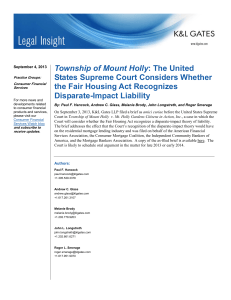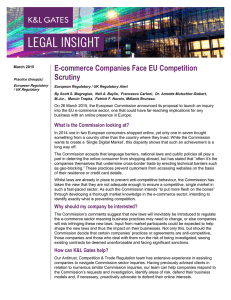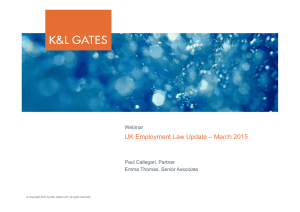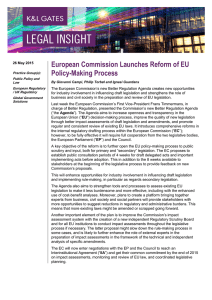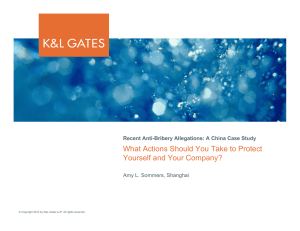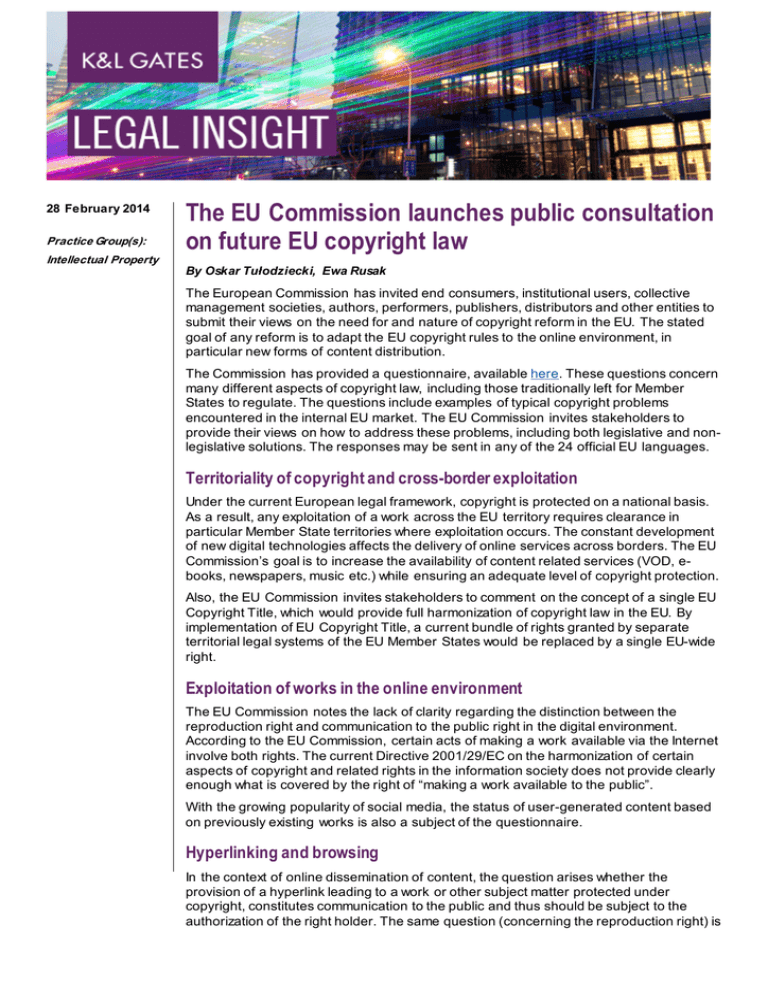
28 February 2014
Practice Group(s):
Intellectual Property
The EU Commission launches public consultation
on future EU copyright law
By Oskar Tułodziecki, Ewa Rusak
The European Commission has invited end consumers, institutional users, collective
management societies, authors, performers, publishers, distributors and other entities to
submit their views on the need for and nature of copyright reform in the EU. The stated
goal of any reform is to adapt the EU copyright rules to the online environment, in
particular new forms of content distribution.
The Commission has provided a questionnaire, available here. These questions concern
many different aspects of copyright law, including those traditionally left for Member
States to regulate. The questions include examples of typical copyright problems
encountered in the internal EU market. The EU Commission invites stakeholders to
provide their views on how to address these problems, including both legislative and nonlegislative solutions. The responses may be sent in any of the 24 official EU languages.
Territoriality of copyright and cross-border exploitation
Under the current European legal framework, copyright is protected on a national basis.
As a result, any exploitation of a work across the EU territory requires clearance in
particular Member State territories where exploitation occurs. The constant development
of new digital technologies affects the delivery of online services across borders. The EU
Commission’s goal is to increase the availability of content related services (VOD, ebooks, newspapers, music etc.) while ensuring an adequate level of copyright protection.
Also, the EU Commission invites stakeholders to comment on the concept of a single EU
Copyright Title, which would provide full harmonization of copyright law in the EU. By
implementation of EU Copyright Title, a current bundle of rights granted by separate
territorial legal systems of the EU Member States would be replaced by a single EU-wide
right.
Exploitation of works in the online environment
The EU Commission notes the lack of clarity regarding the distinction between the
reproduction right and communication to the public right in the digital environment.
According to the EU Commission, certain acts of making a work available via the Internet
involve both rights. The current Directive 2001/29/EC on the harmonization of certain
aspects of copyright and related rights in the information society does not provide clearly
enough what is covered by the right of “making a work available to the public”.
With the growing popularity of social media, the status of user-generated content based
on previously existing works is also a subject of the questionnaire.
Hyperlinking and browsing
In the context of online dissemination of content, the question arises whether the
provision of a hyperlink leading to a work or other subject matter protected under
copyright, constitutes communication to the public and thus should be subject to the
authorization of the right holder. The same question (concerning the reproduction right) is
The EU Commission launches public consultation on future EU
copyright law
posed with respect to creating temporary copies of works while browsing the Internet.
The Commission is seeking comments on whether hyperlinking and browsing should
require authorization of the right holder and whether copyright exceptions or limitations
should apply.
Exhaustion of rights principle
The EU consultations also touch on the exhaustion of rights doctrine as applied to the
distribution of digital copies. Currently in the EU, the principle of exhaustion of rights
applies to the resale of physical copies. However, the recent decision of the Court of
Justice of the European Union in the Oracle vs. UsedSoft case (C-128/11) raises the
question of whether this principle is absolute. On the basis of the responses submitted in
the consultations, the Commission will analyze the consequences of providing a legal
framework enabling the resale of copies previously purchased on the digital market.
Term of copyright protection
The questionnaire also includes questions about the appropriate term of copyright
protection.
Under EU law, the terms of protection of copyright, as well as performance and certain
other so-called “related rights” are longer than what is stipulated in international treaties
(i.e. Berne Convention for the Protection of Literary and Artistic Works and Rome
Convention for the Protection of Performers, Producers of Phonograms and Broadcasting
Organizations).
Currently, the copyright of an author of a literary or artistic work expires 70 years after his
death. The protection of cinematographic or audiovisual works expires 70 years after the
death of the last of the following persons to survive: the principal director, the author of
the screenplay, the author of the dialogue and the composer of music specifically created
for use in the cinematographic or audiovisual work.
With respect to related rights the term of 50 years applies. The rights of performers
expire in principle 50 years after the date of the performance. The rights of producers of
phonograms as well as the rights of producers of the first fixation of an audiovisual
recording expire 50 years after the fixation is made.
Registration of copyrighted works
Under the current legal framework, copyright protection is not conditioned by any
compulsory formalities, such as registration of a work or legending. The sole act of
creation is sufficient for the work to be protected. However, for the purposes of better
identification of works, the implementation of a non-compulsory registration system is
being considered.
The Commission gives examples of complex private databases, platforms and tools
identifying copyrighted works. The stakeholders are invited to submit their views on
whether and how the EU should support development of such sources of information on
works and ownership of rights, which would enable licensing.
Copyright exceptions and limitations
The stakeholders are invited to submit their comments on the existing catalogue of
exceptions and limitations provided in the Directive 2001/29/EC, which include among
others: temporary acts of reproduction which are integral to a technological process,
2
The EU Commission launches public consultation on future EU
copyright law
private copying, exploitation of works for the sole purpose of illustration for teaching or
scientific research, quotation for purposes of criticism or review.
In the debate about the EU copyright law reform, proposals to modify the exceptions and
limitations were presented. New types of preservation of works, archiving publicly
available web content, off-premises access to library collections, temporary access to
digital content (e-lending), data and text mining, as well as licensing of content for certain
educational uses, such as distance learning or non-commercial scientific research, are
covered in the consultation questionnaire.
In addition, the consultations deal with the potential need to harmonize the EU copyright
law with the Marrakesh Treaty to Facilitate Access to Published Works by Visually
Impaired Persons and Persons with Print Disabilities, which require its signatories to
adopt laws that permit the reproduction, distribution and making available of published
works in formats accessible to the impaired persons through limitations and exceptions to
the rights of copyright right holders.
Reprography and private use
The EU Commission suggested that the system of compensation for private copying be
reconsidered.
In particular, the system of levies imposed on devices intended for copying or similar
purposes (copying machines, blank media, scanners etc.) may require verification.
Civil enforcement
Another area identified by the Commission is the efficiency and appropriateness of the
civil enforcement measures provided in the Directive 2004/48/EC of 29 April 2004 on the
enforcement of intellectual property rights. In particular, the stakeholders are invited to
express their views about the need to implement more efficient measures with respect to
infringement of copyright committed with a commercial purpose, the role of
intermediaries and the need to strike a balance between the enforcement system and
privacy and other fundamental rights.
Fair remuneration of authors and performers
The Commission also invites stakeholders to submit their ideas on how authors and
performers should be provided with adequate remuneration for online exploitation of their
rights. In particular, the Commission would like to identify contractual mechanisms that
should be verified and addressed.
As seen from the above, the European Commission has undertaken a very ambitious
task of a very broad review of the EU copyright rules. This task is particularly difficult
because only a few months remain before the expiration of the current term of the
European Parliament and other ruling bodies of the European Union.
3
The EU Commission launches public consultation on future EU
copyright law
For further information please contact:
Warsaw
Oskar Tułodziecki
oskar.tulodziecki@klgates.com
+48.22.653.4211
Berlin
Martin von Albrecht
martin.albrecht@klgates.com
+49.(0)30.220.029.400
Paris
Etienne Drouard
etienne.drouard@klgates.com
+33.(0)158441512
Seattle
Katherine C. Spelman
kate.spelman@klgates.com
+1.206.370.7650
Boston
David J. Byer
david.byer@klgates.com
+1.617.261.3115
Melbourne
Tony Watson
tony.watson@klgates.com
+61.3.9640.4331
Beijing
Xianjin Tian
xianjin.tian@klgates.com
+86.10.5817.6103
Anchorage Austin Beijing Berlin Boston Brisbane Brussels Charleston Charlotte Chicago Dallas Doha Dubai Fort Worth Frankfurt
Harrisburg Hong Kong Houston London Los Angeles Melbourne Miami Milan Moscow Newark New York Orange County Palo Alto
Paris Perth
Pittsburgh Portland Raleigh Research Triangle Park San Diego San Francisco São Paulo Seattle Seoul Shanghai
Singapore Spokane Sydney Taipei Tokyo Warsaw Washington, D.C. Wilmington
K&L Gates practices out of 48 fully integrated offices located in the United States, Asia, Australia, Europe, the
Middle East and South America and represents leading global corporations, growth and middle-market
companies, capital markets participants and entrepreneurs in every major industry group as well as public
sector entities, educational institutions, philanthropic organizations and individuals. For more information
about K&L Gates or its locations, practices and registrations, visit www.klgates.com.
This publication is for informational purposes and does not contain or convey legal advice. The information herein should not be used or relied upon
in regard to any particular facts or circumstances without first consulting a lawyer.
© 2014 K&L Gates LLP. All Rights Reserved.
4



